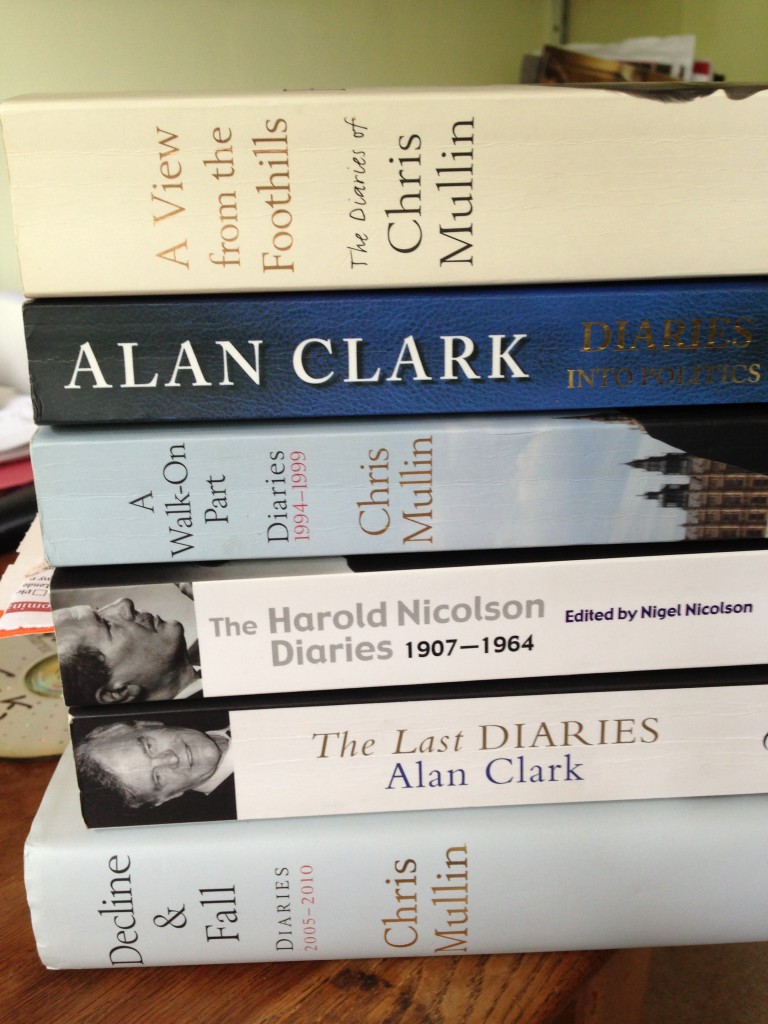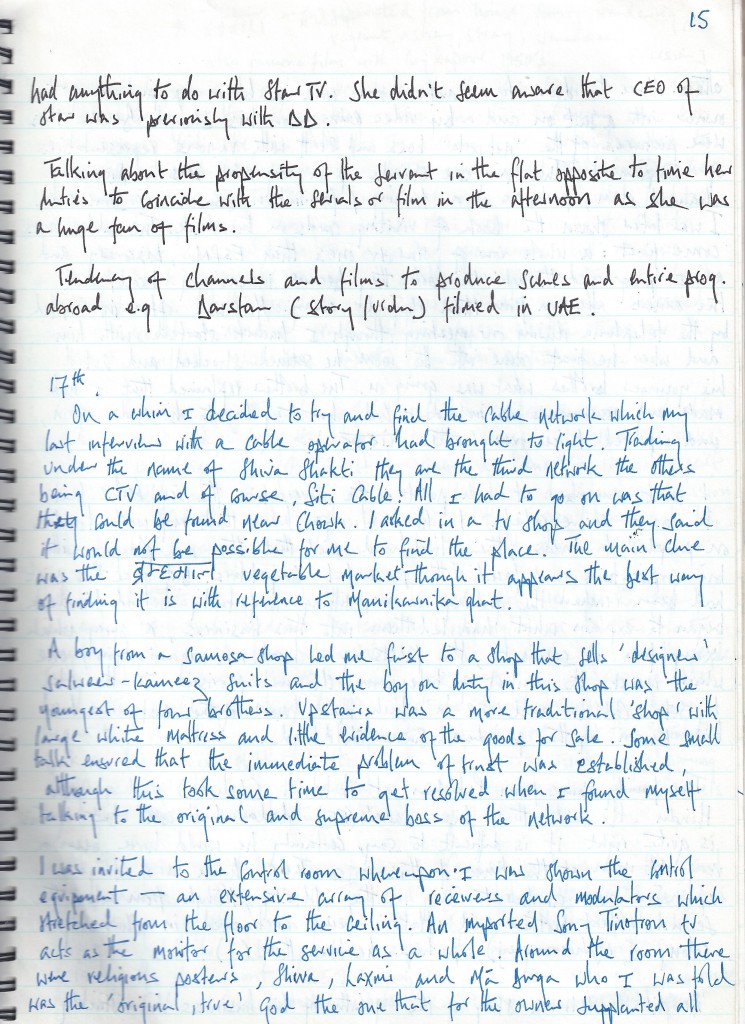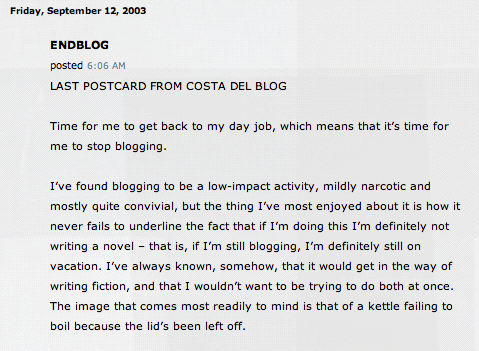This is a piece of writing about writing. The original aim was simply to explore the thought that writing diaries, writing anthropological fieldnotes and maintaining blogs are activities that share some important characteristics. My interest in all three genres, if we can call them that, is that they represent disciplines or routines that involve the documentation of observations which have the ability increase our powers of observation.
My suggestion is that while the web and social media conjures up unimaginably large amounts of content for us to consume, it would be no bad to thing to think more about writing things down (either for oneself or others).
Dear Diary
I’ve spent much of the last year churning through diaries. Mainly diaries written by politicians or political people.

First Chris Mullin’s three volumes of self-deprecating observation of his time in parliament, including his time as ‘Minister for Folding Deckchairs’ and with fascinating insight into the psychology of ‘The Man’ – aka Tony Blair.
Next up the less than self-deprecating Alan Clarke, whose first volume of diaries, published in 1983 is regarded as being both something of a bonkfest and one of the best accounts of the downfall of Thatcher.
Like Mullin, Clarke’s first published diary was not his first. He published a second – Into Politics – written much earlier soon after the first volume, and his wife published, his final volume after his death. (The final section of that diary, in which she takes up the pen, is an extremely moving account of the death of a husband, father and politician and diarist).
I wanted to follow up with Chip Channon’s diaries. Channon was a Tory MP and legendary diarist, widely believed to be, along with Clarke, one of the preeminent diarists of the C20th. (Many of Clarke’s entries see him taking EMT – early morning tea – at his ‘set’ in Albany and dipping into his beloved ‘Chips’). However, a good value copy of these diaries are hard to come by.
So instead I plumped for a volume that spans nearly 60 years and what feels like a couple of epochs. Harold Nicolson was a diplomat at the Versailles Peace conference, and subsequently in Iran and Berlin. Later he was an MP, writer and journalist, and wife of Vita Sackville West, author, gardener and lover of Virginia Woolf.
I don’t know what’s attracted to me to reading about the lives of other people – something about being in my early forties perhaps? What I have been struck by is the obvious and overwhelming commitment that all these three diarists displayed.
When Alan Clarke wrote what would turn out to be his last entry on 1st August 1999 – “The Amazings [his son and daughter-in-law] coming in tomorrow. What can I say to them? The house is like an oven now, excepting the rooms on the north side” he was bringing to close over 45 years of diary writing. His wife, Jane then took up the story of his final days in a green, spiral bound notebook. Likewise, Chris Mullin’s diaries span x years, and for Nicolson, as his son Nigel notes in his edited Diaries and Letter, no day was complete without him writing something. He wrote for over 50 years. Samuel Pepys wrote for 9 years.
Writing clearly require discipline. Weekend newspaper pieces asking writers to describe their day reveal the doggedness determination of the author sweating away for many hours a day in the hope of writing something half decent. “I hate writing, I love having written,” Dorothy Parker is reported as saying. Most writers appear to agree.
Diary writing is clearly a different craft. It is not creative writing in the sense of requiring powers of concentrated, imaginative focus but it does have many other requirements:
* Time to put pen to paper: time that’s found or made
* Energy or willpower to make the effort
* Ability to recall those things that seem worthwhile to document
* Habit that makes the activity effortlessly routine
* Observational talent: the ability to ‘see’ things
Other things might be added to this list such as an interesting and rich life, important and / or indiscreet friends and proximity to power but observational talent seems most important. A diarist has to be able see things that make an ordinary day, even in extra-ordinary or glamorous settings, stand out. They have to notice things.
A Diary in the (Un)Strict Sense of the Term
I’ve never written a diary. But I have kept fieldnotes during a 17 month stretch of fieldwork in India between mid 1996 and 1997. I wrote these everyday with few exceptions and they double, looking back on them, as both a diary of sorts, a set of observations and a scrapbook of ideas. Alongside these fieldnotes, I kept a scrapbook of excerpts from local newspaper and my interviews were transcribed into a series of other books.
Anthropologists note books rarely get an airing. They might be the Crown Jewel’s but they’re rarely displayed and shared. They seem, at least ‘traditionally’, to be deeply personal and private. One person’s record of their fieldwork and the one resources that make their ethnographic account theirs. They were there and they recorded things. But they are not a resource that is required to be shared. In that sense they are similar to many diaries which are not written to be read, at least publicly.

A page from my fieldnotes, July 17th 1997.
How to write fieldnotes was not taught, in the sense that I understand teaching, in grad school. Instead, we were encouraged, I think, to consider the different things that one might record, the different additional data gathering activities we might pursue (such as surveys). Much of the discussion centred around the idea that anthropology is a kind of writing, that there is a politics to the representation of culture in which writing has, and continues to play, a major role. For example, the ‘ethnographic present’ tense used in much ethnographic writing goes a long way to constructing a representation of an unchanging local cultural world.
This set of concerns arose from Writing Culture, a work of major importance in the discipline (here’s a video by the editor to celebrate it’s 25th birthday), which arose from in part a disciplinary crisis within anthropology, and an acceptance that writing was “no longer a marginal, or occulted, dimensions […] writing has merged as central to what anthropologists do both in the field and thereafter” (Clifford). Specially, this volume called out the artificial nature of cultural accounts, and the role of ethnographic texts in creating specific power relations. In short, Writing Culture was a book that made the argument for anthropologists to reconsider how they write and to consider being more adventurous and genre-crossing in their output.
Anthropologists like a good discussion of theoretical issues, but one thing this book lacks is a discussion of how this new way of thinking about writing up fieldwork (and other associated texts) might change how you actually do fieldwork. It also did little to shift the disciplinary conventions around fieldnotes being personal an private productions, not for sharing or dissemination with others, unless the work they related to was specifically collective. It seems to me that two of the primary areas where ethnographic work has shifted most in recent years is first the shared nature of research – research texts are often explicitly co-produced by teams of researcher and / or those people formerly known as ‘research subjects’ and second, the sharing of fieldnotes or observations on the web, usually in the form of blog or Tumblr.
Boiling a kettle with the lid off

William Gibson wrote about some of the ‘dangers’ of blogging in 2003. He doesn’t appear to currently write a blog. He’s not alone. Although Tumblr has probably taken up the slack in terms of gross numbers, the blogosphere ain’t what it used to be.
While there are some obvious and notable exceptions, such as Jason Kottke, very few individually authored blogs (the top 15 blogs in the world are more like magazine publishing operations and have multiple authors) have survived a decade or more.
The kettle has, it seems, boiled dry. What happened? In part, other things. obviously, came along that sucked the air out of blogs. Social media such as Facebook, Twitter for a start. Tumblr encourage a form of ‘blogging lite’ with more focus on sharing that writing, and a sets of affordances that encouraged following than creating. And at heart I guess what changed was that webloggers either simply couldn’t sustain their output (due to constraints of time, money or work) or how they used the blog changed. It become more of an online scrapbook or Commonplace book of, mainly, things they’d found lying around the web (John Naughton’s Memex 1.1 is my favourite in this category).
What may be the case is that writing for a ‘live’ audience (as in the sense of the here and now, as opposed to one day, ‘in the future’), which was has remained a principal aspect of writing a blog, creates a pressure for performance that detracts from the pleasures of the act. Like an actor who suddenly has a bout of stage-fright, or a pilot who suddenly questions the physics of flying, many bloggers felt they didn’t have it in them anymore. So they went undercover. In essence, they became diarists and then, when the blogging frenzy had passed they could start scratching away at their blogs again, in a more private, less exposed and pressured environment.
I was never a rock star blogger, and if you’ve got this far you’ll know that’s never likely to occur, but I did keep a blog going for about 5 years with some discipline. Then I lapsed, Then I started again. Then I lapsed….
I’m trying again to start again and don’t worry about people reading or not reading what I write or the things I post. I see this blog, this space, as something that acts both as a set of fieldnotes and, in a very un-strict sense of the term, a diary. It might even be a blog.
My desire to do this comes back to the point I made about good diarists. They are essentially good at making (and recording) observations and that makes them, at heart, not far removed from a decent anthropologists. Being a diarist doesn’t require you to have an audience, and, in fact, I think for my purposes it is okay to assume a monthly readership of 10 people who stumbled their way here. As I see it there a bunch of reasons why it’s important to try to be a ‘diarist’:
Push oneself to be observant – of people, the things they say, the figures of speech they, the categories they employ and the signs and symbols they press to work in their daily lives
Force oneself to write more and, in the process, become better at writing
Develop new writing skills – the ability to write at greater speed, with better structure and more concision
Grow muscle memory – to habitually put stuff here even when busy because you find it interesting
Give away ideas and replenish them – was it David Ogilvy who said that you should give away ideas because it forces to replenish them. Getting ideas, be they taken or not, out is a good way to move on to the next idea.
Leading ad planner and creative Russell Davies once made a series of similar points with advice to people about how to be more interesting (I think he was actually trying to help people get into advertising planning! – he now has a truly Public Service job at GOV.UK).
I don’t suppose any of this renewed effort will make me more interesting per se, but it will help me improve my skills as an observer of the everyday. That’s my craft and what I do for a living, and one I can always hope to improve.
The diarists who I have enjoyed reading recently have taught me one thing. Their lives, to them at least, were mundane and ordinary even if for the rest of us they were far from it. But they developed skills to observe and craft observations that created wonderful records of their life and times. More importantly, for them at the time, I suspect it made their apprenhension and enjoyment of their lives that much fuller and richer. The lesson? To be a good observer you don’t necessarily need a good audience. (But if you did manage to get this far thanks for reading).
Coda: I originally wrote an outline of this on a website called Helpmewrite and it seems only fitting to thank those who suggested they might be interested in reading this piece…
Written with the help of Paul Sturrock, Amy, Stef Lewandowski, Ann McMeekin Carrier, Bushra, emilyquinton, Paul Birch, and ntlk
